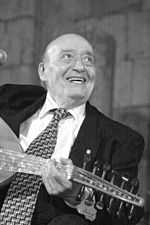Wadih El Safi
| Wadih El Safi | |
|---|---|
 | |
| Background information | |
| Birth name | Wadih Francis |
| Also known as | Sawt Lobnan Al Khaled (The Immortal Voice of Lebanon) |
| Born |
November 1, 1921 Niha, Lebanon |
| Died |
October 11, 2013 (aged 91) Mansourieh, Lebanon |
| Genres | Tarab, Folk |
| Occupations | singer, songwriter, composer, instrumentalist |
| Instruments | oud |
| Years active | 1952–2013 |
| Labels | unknown |
Wadih El Safi (Arabic: وديع الصافي, born Wadi' Francis; November 1, 1921 – October 11, 2013) was a Lebanese singer, songwriter and actor. He is a Lebanese cultural icon, and is often called the "Voice of Lebanon".[1][2] Born in Niha, Lebanon, Wadih El Safi started his artistic journey at the age of seventeen when he took part in a singing contest held by Lebanese Radio and was chosen the winner among fifty other competitors.
Musical career
Wadih El Safi is a classically trained tenor, having studied at the Beirut National Conservatory of Music. He became nationally known when, at seventeen, he won a vocal competition sponsored by the Lebanese Broadcasting Network.[3] El Safi began composing and performing songs that drew upon his rural upbringing and love of traditional melodies, blended with an urban sound, and creating a new style of modernized Lebanese folk music
In 1947, El Safi traveled to Brazil, where he remained until 1950.
El Safi toured the world, singing in many languages, including Arabic, Syriac, French, Portuguese and Italian[citation needed].
In the spring of 1973, El Safi recorded and released a vinyl single with the songs "Grishlah Idi" lyrics by Ninos Aho and "Iman Ya Zawna" (lyrics by Amanuel Salamon), first one in Western Syriac and second one in Eastern Syriac. The music arrangements were done by Nuri Iskandar and the songs were produced especially for an Aramean Festival, which occurred in the UNESCO building in Beirut at that time where El Safi participated as a singer.
Songs and recordings
El Safi has written over 3000 songs [citation needed]. He is well known for his mawawil (an improvised singing style) of 'ataba, mijana, and Abu el Zuluf. He has performed and recorded with many well-known Lebanese musicians, including, Fairouz, and Sabah.
Health problems and death
In 1990, Wadih El Safih underwent open heart surgery.[4] In 2012, he broke his leg and had to have surgery to mend the fracture. After the surgery, his health declined quickly. In 2013, he was admitted to hospital, suffering from pulmonary consolidation. On October 11, 2013, he fell ill at his son's home and was rushed to the Bellevue Medical Center where he died.[5] His funeral was held at Saint George Maronite Cathedral, Beirut on October 14, 2013.[6]
Discography
As performer
- Best of Wadi – Vol. 1 (EMI, 1999)
- Best of Wadi – Vol. 2
- Best of Wadi – Vol. 3
- Inta Omri (2000)
- The Two Tenors:Wadi Al Safi Aad Sabah Fakhri (Ark 21, 2000)
- Wadih El-Safi and José Fernandez (Elef Records)
- Wetdallou Bkheir
- Rouh ya zaman al madi atfal qana
- Chante Le Liban
- Wadi El Safi / Legends Of The 20th Century
- Mersal El Hawa
- Mahrajan Al Anwar
- Youghani Loubnan
- Ajmal El Aghani
As composer
- Cantiques de l'Orient (Harmonia Mundi Fr., 1996)
- Psaumes Pour Le 3ème Millénaire (Angel Records, 2002)
As sideman
- Music of Arabia, Hanaan and her ensemble. Request Records (New Rochelle, New York) SRLP 8083 (as Wadih El-Saffi on oud)
See also
- List of Lebanese people
- Lebanon
- Middle East
- Fairuz
- Zajal
References
- ↑ "World Music:Wadih El Safi, Place des Arts, Montreal". sixmoons.com. Retrieved 2007-11-23.
- ↑ "Classic Streams on Afropop Worldwide". Afropop Worldwide. Retrieved 2007-11-23.
- ↑ "Wadih El Safi". May Audio. Retrieved 2007-11-23.
- ↑ "Death of Wadih El Safi, the Voice of the Mountains". BBC (in Arabic). October 11, 2013.
- ↑ National News Agency (Lebanon): وديع الصافي في ذمة الله (in Arabic)
- ↑ "‘The Frank Sinatra of the Mideast:’ Lebanese singer Wadih El Safi dies". Al Arabiya. October 12, 2013.
External links
- Wadih El Safi at the Internet Movie Database
- Music Of Lebanon
- Wadih El Safi - Arabic Nights
- Wadih El Safi biography and articles
|